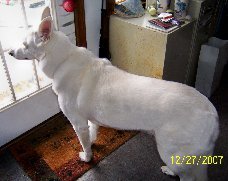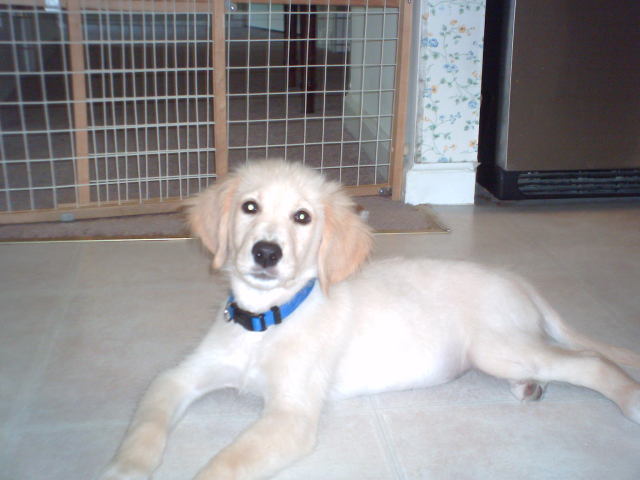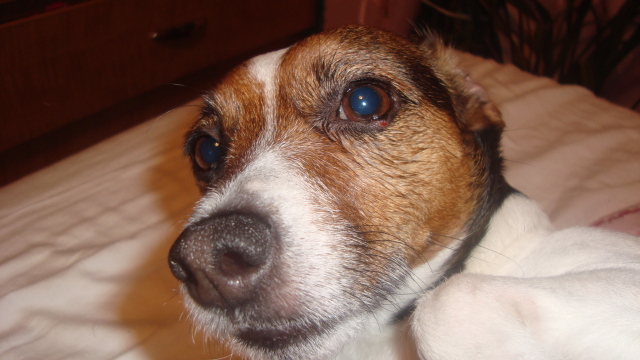QuestionI have cared for this 8-yr-old cat for 4 months. She seemed to aclimate well to my home and our family who are all adults. Since December she has been defecating infrequently now only once a week for the past three weeks. I am very concerned. I have given her a Vaseline based laxative on her nose every other day but she dosen't like it. I got this from the local vet who saw her on Dec. 31, 04 & said at that time she was not impacted. She does cough some times & produces nothing.
AnswerHello S. -
I am sorry I have not responded sooner, I have been battling a sinus infection.
Constipation can become a problem in older cats and can be caused by a variety of things. Dietary and environmental (hair, bones), Painful defecation (anal/rectal disease), Obstructive (old pelvic fracture, tumors), Neurological (paralysis, spinal cord disease, megacolon), Metabolic and hormonal (low potassium), and can be drug induced. Here is some information on the various types of constipation cats can be affected by. Constipation is different from obstipation, which is complete fecal obstruction. When cats have obstipation, it impossible for them to defecate. The colon becomes filled with rock-hard feces. Constipation generally has a good prognosis, but cats with obstipation usually develop irreversible changes in the muscle of their colon. Constipation is also different from megacolon, which refers to the condition of extreme colonic dilation, and is a disorder of the structure and function of the colon. Cats with megacolon are always constipated, however constipated cats don't necessarily have megacolon. Megacolon can be primary or secondary. It can be caused by a primary defect in the nerve supply of the colon, or it can become secondary to any lesion or disease that prevents normal defecation over a long period of time.
Without more information I cannot determine the underlying cause of your cats constipation problem but here are a few natural remedies you can try to help relieve your pet.
Begin to add Garlic powder to your pets food. Garlic is an anti-microbial and will fight bacteria and infection if there is one present. It will not hurt your pet only help strengthen her immune system. Don't be afraid to sprinkle it with a heavy hand, cats love Garlic and she should eat it up right away. If she is not eating, boil the Garlic powder with water and administer it to her with an eye dropper.
You must restore her electrolyte level and fluids. Make sure she is drinking plenty of fluids. Add chicken or beef broth to her food if she eats dry food this will help soften the food and will also help increase vitamins and minerals in her system.
The Vaseling based laxative sounds like Lactulose. Its not to bad of a medication but you could try adding vegetable oil to her food instead. This really works well and should help push the stool through the system faster. Lactulose and similar products tend to pull water from the colon and at times can cause more harm then good.
Try an Aloe vera supplement. Aloe vera is used by humans and animals to clean, soothe and lubricate the internal system. It has been used in cases of acid reflux disease and is used when healing dry or injured skin. Between the vegetable oil and Aloe your pet should pass something.
If you still don't have luck with the vegetable oil and Aloe, try adding Psyllium seeds to her diet. Psyllium seeds are found in Metamucil type products. A lot of vets will recommend you give your pet Metamucil but I don't agree, it doesn't work well with their systems and can be more dehydrating. You can purchase Psyllium seeds sometimes from your Pharmacy, if not you could try a health food store and if all else fails you can order them online from a reputable herb seller. Try www.jeansgreens.com, I purchase herbs from them and they are certfied organic.
This is a must . . . Cat Grass. You can purchase the seeds and the grass itself from most larger pet stores. Cats crave grass, although they don't show it, the folic acid found in grass helps with their digestion and over all health. My cat loves it, if your cat has been indoors for a while it might take her a few weeks to realize its there but once she does, keep it fresh and handy.
I suggest you take your pet back to the veterinarian for a full and thorough evaluation. Be sure she checks for tumors and any type of obstruction in the colon area. Make sure the x-ray taken is clear and readable. Sometimes cats don't sit still and the x-ray can be blurred. This is a serious issue and I would strongly follow up with your veterinarian. I can't understand if she didn't see and obstruction of any sort why she didn't want to proceed with an enema anyway to relieve the pet. Although, I don't totally agree with the process of an enema for a cat, it may be benficial in your situation.
She may a have a hair ball. Sometimes they don't show on an x-ray but are the culprit for constipation. With your pet coughing and producing nothing, it sounds like a hairball.
I hope this information has helped you and your pet.
If you would like further information on natural and herbal remedies for human and animal concerns please contact me at wintersaurora@yahoo.com and I will be happy to assist you and send you a catalog of my home made herbal remedies. A note here, I make a tea for cats who are constipated, let me know if you would like to try it.
Thank you and best wishes to you and your pet.
Sincerely,
Sharon Hubbs, AHG
Certified Natural Health Consultant & Herbalist

 Sudden change in 11 yr old shepherd - Try NuVET Plus .... worth a try...
QuestionHi Marie, I have an 11 year old German shepherd
Sudden change in 11 yr old shepherd - Try NuVET Plus .... worth a try...
QuestionHi Marie, I have an 11 year old German shepherd
 allergic to fleas
Questionmy 3 year old lab is allergic to fleas I was wo
allergic to fleas
Questionmy 3 year old lab is allergic to fleas I was wo
 cat with runny nose
QuestionA stray cat has taken up living with us. Shes a
cat with runny nose
QuestionA stray cat has taken up living with us. Shes a
 Eye wart or scratch
Question
The dog
My dog (jack russel terrier) has somet
Eye wart or scratch
Question
The dog
My dog (jack russel terrier) has somet
 ACL...partial tear! in Boxer ;
Question
Blanca
Hello Marie,
My 2 1/2 year old female
ACL...partial tear! in Boxer ;
Question
Blanca
Hello Marie,
My 2 1/2 year old female